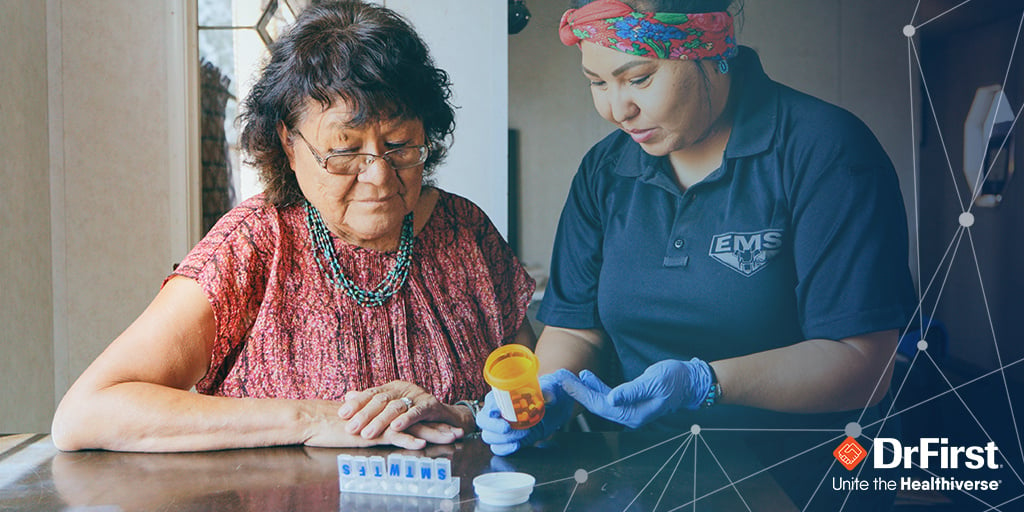Integrated workflows ease staff burden and satisfy regulatory mandates.
Patients With Heart and Lung Disease Are More Likely to Follow Medication Therapy When They Participate in a Mobile Integrated Healthcare Program


December 6, 2022
Patients With Heart and Lung Disease Are More Likely to Follow Medication Therapy When They Participate in a Mobile Integrated Healthcare Program
Increasing Patients’ Medication Adherence Can Improve Outcomes and Avoid Hospital Readmissions
Rockville, Md. – Dec. 6, 2022 – Patients with chronic heart disease and lung disease are more likely to fill their prescriptions when enrolled in a Mobile Integrated Healthcare and Community Paramedicine (MIH-CP) program after hospital discharge, according to a new study by the University of Maryland published in the December 2022 issue of Exploratory Research in Social and Clinical Pharmacy. MIH-CP programs use specially trained paramedics in collaboration with other healthcare providers to visit patients in their homes to help reduce hospital readmissions, improve care coordination, and shorten 911 response times.
Prescription first-fill rates increased by nearly 20% for patients with congestive heart failure (CHF) and 25% for patients with chronic obstructive pulmonary disease (COPD) in the first 30 days after enrollment. The six-month pilot also improved medication adherence by 8% to 14% in the 60 days after a pharmacist-led intervention. Because the improvements did not continue beyond 30-60 days, the study authors suggest that adding additional interventions could achieve an ongoing impact on medication adherence.
“These results are particularly exciting because patients with chronic health conditions are at greater risk of poor outcomes if they don’t take their medications as prescribed,” said Colin Banas, M.D., M.H.A., chief medical officer for DrFirst and one of the study’s authors. “Pharmacist-led programs like this have a long history of improving medication use. As value-based care and risk-based contracts grow in prominence, healthcare organizations are turning to innovative ways to manage care for high-risk patients, so they have better health outcomes and stay out of the hospital as much as possible.”
Patients who don’t take their medication as prescribed are more likely to have poor clinical outcomes and higher healthcare costs; they are also 2.5 times more likely to experience hospital readmission. Unplanned hospital readmissions cost an average of $11,000 per patient, according to the Society of Hospital Medicine and health systems face costly penalties for readmissions within 30 days of discharge as part of the Centers for Medicare & Medicaid Services’ value-based reimbursement models.
After discharge from the hospital, the study assigned high-risk patients with CHF and COPD to the MIH-CP program affiliated with the University of Maryland Medical Center for intensive follow-up. To establish a baseline and measure the impact of these pharmacist-led interventions on patients with these chronic conditions, the team used data from DrFirst’s MedHx PRM to measure individual prescription fill data for specific populations of patients.
“We were able to merge Epic’s Clarity data with the MedHx PRM data to calculate first-fill rates for new medications,” said Olufunke Sokan, Pharm.D., advanced practice pharmacist at the University of Maryland School of Pharmacy and lead author of the study. Clinicians used this information to monitor prescription fill patterns and counsel patients accordingly.
The MIH-CP program included a field team of specially trained community paramedics and a pharmacy technician, working with a virtual team comprised of a pharmacist, a community health worker, and an advanced licensed provider such as a nurse practitioner or physician. The field team visited patients in their homes and connected as needed with the virtual team using a HIPAA-compliant telehealth video platform.
The peer-reviewed article, “Impact of a mobile integrated healthcare and community paramedicine program on improving medication adherence in patients with congestive heart failure and chronic obstructive pulmonary disease after hospital discharge: A pilot study,” is authored by clinicians from the University of Maryland School of Pharmacy, University of Maryland School of Medicine, and University of Maryland Medical Center, as well as members of DrFirst’s Applied Clinical Research team.
About DrFirst
Since 2000, DrFirst has pioneered healthcare technology solutions and consulting services that securely connect people at touchpoints of care to improve patient outcomes. We create unconventional solutions that solve care collaboration, medication management, price transparency, and adherence challenges faced in healthcare. We unite the Healthiverse—the interconnected healthcare universe—by providing our clients with real-time access to the information they need, exactly when and how they need it, so patients get the best care possible. DrFirst solutions are used by nearly 325,000 healthcare professionals, including more than 220,000 prescribers, 70,000 pharmacies, 300 EHRs and health information systems, and 1,500 hospitals in the U.S. and Canada. To learn more, visit www.DrFirst.com and follow @DrFirst.
Media Contact
Katlyn Nesvold
Amendola Communications for DrFirst
715-559-0046
knesvold@acmarketingpr.com


